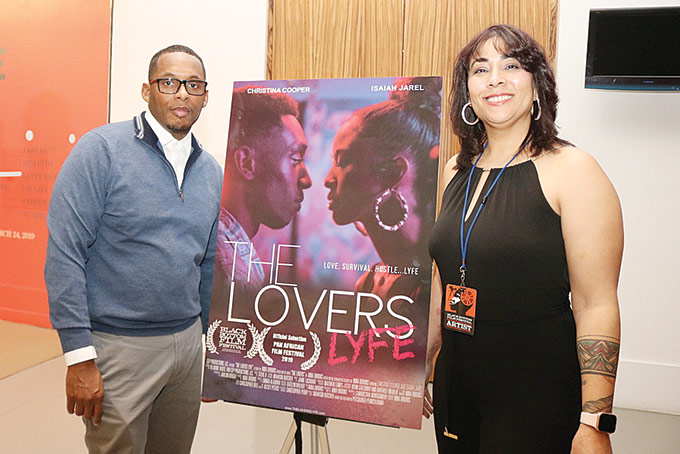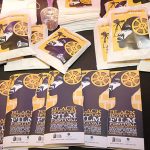
With two African American films in contention for the Academy Award for Best Movie (one of which won the Oscar, “Green Book”) and several other nominations for onscreen and off-screen contributions, the third iteration of the Black Bottom Film Festival is strategically placed for growth.
BBFF marks Black History Month by spotlighting the oral storytelling traditional of African Americans—captured in film. The August Wilson Center first presented BBFF in 2017 as a weekend spotlighting Black cinema and its luminaries. Michael Schultz, director of “Cooley High,” “Carwash,” “Which Way is Up,” “The Last Dragon” and “Krush Groove,” was on hand and shared his stories of working in Hollywood.
This year BBFF expanded its presence with screenings at the Rowhouse Cinema in Lawrenceville, still embracing a range of genres that include classics like “Native Son,” a 1951 adaptation based on the Richard Wright novel of the same name, Melvin Van Peeple’s seminal “Sweet Sweetback’s Baadasssss Song” (1971); “Richard Pryor: Live in Concert” (1979); and “Life and Nothing More” (2017), a young man’s coming-of-age story and search for purpose. The weekday screenings also included two Oscar nominees: “Hale County This Morning,” “This Evening” (Best Documentary Feature) and “If Beale Street Could Talk,” the film in which Regina King won the 2019 Oscar for Actress in a Supporting Role.
BBFF transitioned to the August Wilson Center with a screening of “Children of NAN” by local artist/educator Alisha Wormsley, a tale of a dystopian future followed by a Q&A with Wormsley.
There were also improvisational acting workshops at the August Wilson Center—one for children and another led by actor/comedian Kim Coles. Part testimony and immersion, Cole touched on several acting elements that included drama, comedy and storytelling as she engaged attendees in spontaneous improvisational exercises.
Not missing an opportunity to be timely and relevant, BBFF offered a screening of 1978’s “The Wiz” marking the 40th anniversary of the film’s release with Diana Ross, Nipsey Russell, Michael Jackson, Ted Ross and Richard Pryor; the screening was free to kids 13 and under.
Shorts and Q&As continued the day. “They Charge for The Sun” by director Terrance Nance was about a not-so-distant future sci-fi fantasy where sunlight is rare and a rationed commodity of the government. But a young girl defies protocol and discovers the truth.
In addition, a documentary shown, entitled “Horror Noire: A History of Black Horror” was both entertainment and education. Digging deep into a century of scary movies, “Horror Noire” juxtaposes the evolution of the film genre with race relations/perceptions in America through the voices of filmmakers, scholars and actors from the “Black Bogeyman” to “Blacula,” “Candyman” and the groundbreaking “Get Out.” Adapted from the seminal book by Robin R. Means, PhD, (and Peabody graduate), this in-depth examination includes observations from Jordan Peele, Keith David, Tony Todd, Rachel True, Loretta Devine and Tananarive Due, who says “Black horror is Black history.”
Dr. Means was in attendance for the Q&A with Christiane Delores after the screening.
On the final day of the BBFF (Feb. 24), there was a very intensive screenwriting workshop led by actor/director/writer Gerald Brown. His session was so well received that it ran more than 30 minutes beyond its scheduled time. Brown’s screen credits include “Juice,” “Monster: The Life of a L.A. Gang Member” and “High Caliber;” as well as an adjunct professor at Hofstra University and a guest lecturer at New York University, Duke University, and Howard University.
“For Love of Ivy,” a 1968 rom-com with a screenplay and performance by Sir Sidney Poitier, was the feature film of the last day of the festival. Its cast included Abbey Lincoln, Beau Bridges and Carroll O’Connor. The theme song by Quincy Jones and Bob Russell was nominated for an Academy Award for Best Original Song and the film garnered supporting acting nominations for Lincoln and O’Connor.
An experimental short by Pamela Woolford demonstrated an intimate technique of storytelling involving multiple art disciplines, innovative use of dialogue and narrative.
Also on Feb. 24, little-known facts were revealed in “Ali’s Comeback: The Untold Story.” Filmmaker Art Jones documented all of the behind-the-scenes maneuvering involved in staging the comeback of America’s most polarizing person against the backdrop of the Vietnam and the Black Power movement. Unlikely alliances converged to make Muhammad Ali’s boxing comeback against the reigning champion Jerry Quarry a reality in Atlanta. This stylized recollection is presented in rounds, and some of those rounds were true knockouts inside and outside the ring (especially the afterparty round!).
The film fare concluded with three shorts: “The Blue Wall: A Conspiracy Against Citizens” by actor Richard Spencer, in response to a shooting of an unarmed Black man by the police through the eyes of the Black officer who pulls the trigger; local entry “Lover’s Lyfe” written by Nina Brooks and directed by Emmai Alaquiva; and “Pas Honteux,” a rumination about a convergence of language, gentrification and male/female relationship by John “Dr. Teeth” Tucker.
BBFF is a collaboration of festival curator Joseph L. Lewis III and fellow film aficionado Janis Burley Wilson, President and CEO of the August Wilson Cultural Center.
“The Black Bottom is a celebration of the Black artistic voice and creative stamina,” Lewis said.
Like us at https://www.facebook.com/pages/New-Pittsburgh-Courier/143866755628836?ref=hl
Follow @NewPghCourier on Twitter https://twitter.com/NewPghCourier



